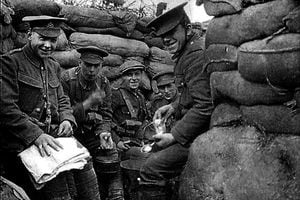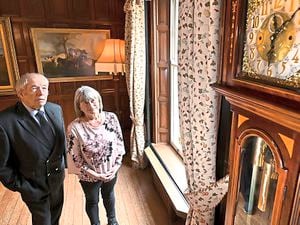Staffordshire talk brings realities of war to life
The Great War claimed the lives of millions of soldiers and civilians – yet amid the bloodshed these Staffordshire soldiers managed to raise a smile as they tucked into meals sent from home.

The picture is one of many insights into life on the trenches during the First World War, which will be the subject of an upcoming talk at the county's National Memorial Arboretum.
It shows the 1st 6th South Staffordshire Regiment somewhere along the Western Front in 1915.
Author Joss Musgrove, who will deliver the session at the National Memorial Arboretum on December 17, said: "Most of what the soldiers would have got there would have been sent from home. They got all kinds of things come through the post. One soldier received ham and tomatoes. Apparently the ham was okay but the tomatoes weren't. It was a great way to subsidise the food which the army provided which was incredibly monotonous."
Ms Musgrove, aged 45, and from Lichfield, is hoping to bring the trenches to life during the talk combining factual background with painstaking detail of everything the soldiers experienced in between battle.
First-hand accounts will include letters from Staffordshire Regiment men Sidney Norton, of Tamworth as well as Captain John 'Jake' Armes, from Stoke-on-Trent who experienced the famous 1914 Christmas truce which saw British and German soldiers down their weapons for 48 hours. It started when a handful of troops on both sides started singing songs to each other from across the battle lines and, some according to accounts, took a leap of faith by walking out into the middle of No Man's Land to meet their adversaries. A large part of the talk is called 'A spotlight on Christmas in the Trenches'.
Ms Musgrove added: "Jake Armes was actually there during the Christmas truce he was typing his letter home to his wife.
"He would go up and talk to German officers and then go and get on his typewriter. It (the letter) is a remarkable artefact to have. But the accounts are just a basis for our talk. I will also be letting people look at things like World War I post cards. I really want people to feel what it was like to be in the trenches."





